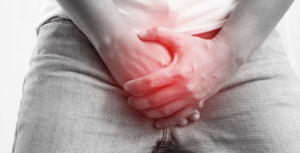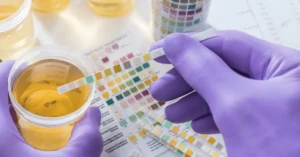Genital lesions can be a cause of concern and discomfort, but it’s important to remember that they are quite common and often treatable. Genital lesions have a variety of causes – some are sexually transmitted and others are not. An appointment with an experienced GP for examination and testing is the best way forward for fast diagnosis and treatment.
Common Causes of Genital Lesions:
1. Sexually Transmitted Infections (STIs): Certain STIs, like herpes, syphilis, and genital warts, can lead to the development of genital lesions. These lesions may appear as sores, blisters, or growths and are usually accompanied by other symptoms such as itching or pain. These infections can be diagnosed with examination and, where needed, testing. Testing is usually blood testing and swab testing.
2. Non-Sexual Skin Conditions: Certain skin conditions, including eczema, psoriasis, and lichen planus, can also manifest as genital lesions. These conditions are not sexually transmitted but can cause discomfort and require appropriate treatment.
3. In-Grown Hair & Boils: These are very common causes of lumps and bumps in areas where pubic hair grows. Inflammation and/or infection can cause the presence of pus and growth in the area.
4. Allergic Reactions: Contact dermatitis, which is caused by an allergic reaction to specific substances such as soaps, detergents, or latex, can result in genital lesions. Identifying the allergen and avoiding further exposure can help alleviate symptoms.
5. Trauma or Injury: Genital lesions can also occur due to physical trauma or injury, such as excessive friction during sexual activity, shaving, or accidental cuts. These lesions typically heal on their own with proper hygiene and wound care.
Treatment Options:
1. Medical Consultation: If you notice any genital lesions, it is essential to consult a healthcare professional for an accurate diagnosis and appropriate treatment. They will conduct a physical examination, review your medical history, and order any necessary tests.
2. Antiviral Medications: In cases where viral infections, such as herpes, cause genital lesions, antiviral medications may be prescribed to manage symptoms, prevent outbreaks, and reduce the risk of transmission.
3. Cryotherapy: for genital warts, there are several treatment options, including cryotherapy, which freezes the warts away.
4. Topical Treatments: Depending on the cause, your healthcare provider may recommend topical creams or ointments to alleviate discomfort, reduce inflammation, and promote healing.
5. Pain Management: Genital lesions can often cause pain or discomfort. Over-the-counter pain relievers can help manage these symptoms. However, it is crucial to follow the recommended dosage and consult a healthcare professional if the pain persists or worsens.
6. Lifestyle Modifications: Making certain lifestyle changes can help prevent and manage genital lesions. These may include practising safe sex, maintaining good hygiene, avoiding irritants or allergens, and keeping the genital area clean and dry.
While genital lesions can be distressing, it’s important to remember that many causes are treatable, and seeking medical advice is crucial for appropriate diagnosis and treatment. Remember, self-diagnosis or self-medication is not recommended when dealing with genital lesions. Call us today or book online for fast support.

















